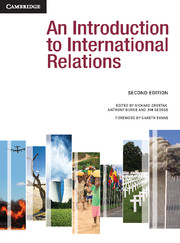Book contents
- Frontmatter
- Contents
- Tables, Figures and Boxes
- Contributors
- Preface and acknowledgements
- An Introduction to International Relations: The origins and changing agendas of a discipline
- 1 Theories of International Relations
- 2 The Traditional Agenda
- 3 The New Agenda
- 21 The United Nations
- 22 Non-State Actors: Multinational Corporations and International Non-Governmental Organisations
- 23 Religion and Secularism
- 24 Global Economic Institutions
- 25 Global Trade
- 26 Global Finance
- 27 Global Poverty, Inequality and Development
- 28 Globalisation and Its Critics
- 29 Global Terrorism
- 30 Post-Conflict State-Building
- 31 Humanitarian Intervention
- 32 Human Rights
- 33 Migration and Refugees
- 34 Global Environmental Politics
- 35 Climate Change
- Glossary of Terms
- Bibliography
- Index
- References
33 - Migration and Refugees
from 3 - The New Agenda
- Frontmatter
- Contents
- Tables, Figures and Boxes
- Contributors
- Preface and acknowledgements
- An Introduction to International Relations: The origins and changing agendas of a discipline
- 1 Theories of International Relations
- 2 The Traditional Agenda
- 3 The New Agenda
- 21 The United Nations
- 22 Non-State Actors: Multinational Corporations and International Non-Governmental Organisations
- 23 Religion and Secularism
- 24 Global Economic Institutions
- 25 Global Trade
- 26 Global Finance
- 27 Global Poverty, Inequality and Development
- 28 Globalisation and Its Critics
- 29 Global Terrorism
- 30 Post-Conflict State-Building
- 31 Humanitarian Intervention
- 32 Human Rights
- 33 Migration and Refugees
- 34 Global Environmental Politics
- 35 Climate Change
- Glossary of Terms
- Bibliography
- Index
- References
Summary
Introduction
This chapter proceeds in four sections. The first looks at how the two terms, ‘migrant’ and ‘refugee’, came to be defined as distinct from each other in the context of the modern state. As the reification of borders intensified in the nineteenth and twentieth centuries, citizenship became an essential part of ‘belonging’ to a state as well as indicating the strength of the state itself. Hence, the categorisation of those ‘outside’ the state developed as a way of ascertaining who belonged and who did not. The second examines how states define and categorise refugees through laws that seek to contain and limit their flow. The third is concerned with the consequences of limiting the definition of a refugee, which has led to an unequal burden between developed and developing states. The final section will canvass the various options presented to reduce the present imbalance where the vast majority of the world’s ‘people of concern’ eke out an existence in refugee camps in developing countries. Ultimately, this chapter seeks to demonstrate that the choices made by states in border protection become the key determinants of how refugees will be accepted. Adherence to international refugee law will not necessarily address all the problems associated with refugees, but nor will seeing refugees as unwanted intruders in contrast to ‘desirable’ migrants.
States, refugees and immigrants
The former Prime Minister of Australia, John Howard, campaigned in the 2001 federal election under the banner ‘we will decide who comes to this country and under what circumstances’ (Marr and Wilkinson 2003: 277). As this slogan demonstrates, there is arguably no greater control than determining who is a ‘legitimate’ citizen of the state – that is, determining who can and cannot live within your borders. Being able to secure borders and identify when they are being breached is essential to state sovereignty. Entry into a state without permission is seen as an ‘illegal’ breach of sovereignty, or even a threat to sovereignty. Consider Canadian Prime Minister Stephen Harper’s comments in relation to the arrival of Sri Lankan asylum seekers who stowed away on a cargo ship: ‘It’s a fundamental exercise of sovereignty and we’re responsible for the security of our borders and the ability to welcome people or not welcome people when they come’ (Sydney Morning Herald 2010). The determination of whether an individual’s crossing of a border is deemed as illegal, threatening or permissible is part of how a state constructs its identity and territoriality. Therefore, this chapter will first look at how states define an individual’s entry, through tracing the development of the term ‘refugee’, contrasting it to the term ‘migrant’ and exploring how this delineation affects the lives of people seeking entry into states.
- Type
- Chapter
- Information
- An Introduction to International Relations , pp. 450 - 461Publisher: Cambridge University PressPrint publication year: 2011



